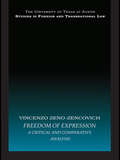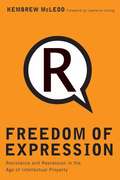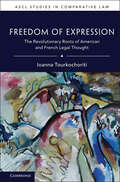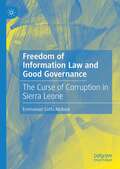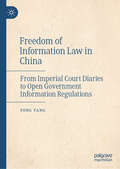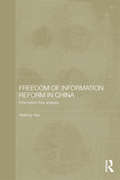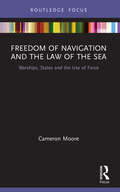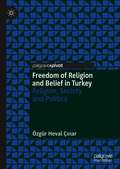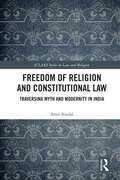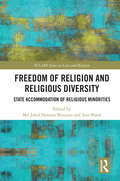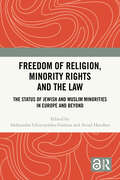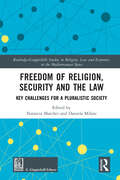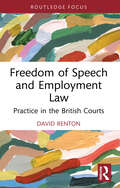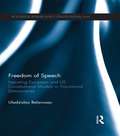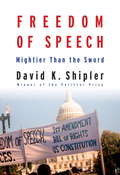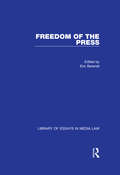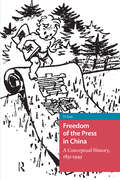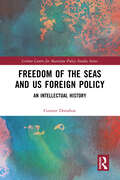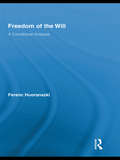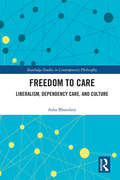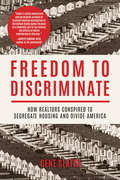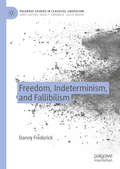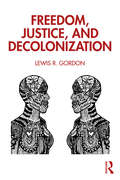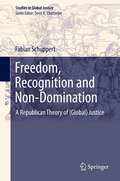- Table View
- List View
Freedom of Expression: A critical and comparative analysis (UT Austin Studies in Foreign and Transnational Law)
by Vincenzo Zeno-ZencovichThis book takes a multidisciplinary approach to the issues surrounding freedom of expression, looking at the current legal position in a number of European countries as well as engaging with the wider debates on the topic amongst sociologists, political scientists and economists. In the book Vincenzo Zeno-Zencovich addresses recent developments which have had a bearing on the debate including the changes in communication brought about by the internet, and the growing role of the European Union and the Council of Europe.
Freedom of Expression: Resistance and Repression in the Age of Intellectual Property
by Kembrew McleodThis is about the ways in which intellectual property laws have been used to privatize all forms of expression including the right of speech.
Freedom of Expression: The Revolutionary Roots of American and French Legal Thought (ASCL Studies in Comparative Law)
by Ioanna TourkochoritiTwo legal systems founded from similar Enlightenment philosophical and political values use state coercion differently to regulate a core liberty: the freedom of expression. This comparative study of France and the United States proposes a novel theory of how the limits of freedom of expression are informed by different revolutionary experiences and constitutional and political arrangements. Ioanna Tourkochoriti argues that the different ways freedom of expression is balanced against other values in France and the United States can be understood in reference to the role of the government and the understanding of republicanism and liberty. This understanding affects how jurists define the content and the limits of a liberty and strike a balance between liberties in conflict. Exploring both the legal traditions of the two countries, this study sheds new light on the broader historical, social and philosophical contexts in which jurists operate.
Freedom of Information Law and Good Governance: The Curse of Corruption in Sierra Leone
by Emmanuel Saffa AbdulaiThis book argues that Sierra Leone’s ten-year civil conflict demonstrates the criticality of freedom of information (FOI) as a facet of good governance where corruption thrives, spanning both public and private sectors, if Sierra Leone’s continued security and stability are to be ensured. It argues that it was the absence of an anti-corruption tool like FOI and its attendants, transparency, and accountability, in governance generally, and in the area of the extractive industry in particular, that lead to other social phenomena which directly sparked the war. It proffers that for the continued consolidation of peace, security, stability and development in Sierra Leone, transparency and accountability must be ensured by protecting and implementing the demand driven anti-graft FOI.Straddling the disciplines of law, political science, public policy, and history, the book’s major premise is that it was the absence of FOI in the area of governance and the extractive industry, which enabled politicians, civil servants and the politically connected to ransom and exploit Sierra Leone’s mineral resources for their own profit with impunity, a state of affairs which led to underdevelopment, state collapse and an embittered civil populace especially the youth. The book postulates that as such any attempt to ensure long-term peace in Sierra Leone, should seek to avoid replicating the conditions that gave rise to that gruesome conflict- elites expropriation of national resources through endemic graft. The book proposes the comprehensive and effective implementation of the Right to Information Act 2013.
Freedom of Information Law in China: From Imperial Court Dairies to Open Government Information Regulations
by Yong TangThis book assesses and critiques the legal right of access to government-held information in China with a special focus on legislative history, rationales, statutory language and efficacy of the Open Government Information (OGI) Regulations enacted in 2007 by the Chinese government. The book, written by a former Chinese journalist who later became an American professor of journalism, combines thorough examination and insightful commentary on relevant statutes and court cases with in-depth interviews with Chinese legal scholars, lawyers, journalists and government officials. For anyone with an interest in China&’s legal and informational systems in general and its freedom of information law in particular, the book is a must read that not only explains why China&’s first freedom of information law failed so miserably when it was needed the most in a COVID-19 pandemic but also sheds light on the world&’s largest and most sophisticated propaganda apparatus that controls and manipulates flow of information in and outside of China.
Freedom of Information Reform in China: Information Flow Analysis (Routledge Law in Asia)
by Weibing XiaoFreedom of Information (FOI) in China is often perceived as a recent and intriguing phenomenon. This book presents a more complex and detailed understanding of the evolution of FOI in China, using information flow analysis to explore the gradual development of government receptivity to FOI in an information environment through time. The book argues that it is necessary to reassess the widely divergent origins of FOI reform in China, and asserts that social, political and legal factors should have central roles in understanding the development of FOI in China. The book uses information flow analysis to find that FOI reform in China formed part of a much longer process of increased transparency in the Chinese information environment, which gradually shifted from the acceptance of proactive disclosure to that of reactive disclosure. FOI thus has become a beneficiary of this gradual transformation of the Chinese information environment.
Freedom of Navigation and the Law of the Sea: Warships, States and the Use of Force (Routledge Research on the Law of the Sea)
by Cameron MooreThere has been a recent increase in clashes between warships asserting rights to navigate and states asserting sovereignty over coastal waters. This book argues for a set of rules which respect the rights of coastal states to protect their sovereignty and of warships to navigate lawfully, whilst also outlining the limits of each. The book addresses the issue of the clash between warships and states by considering the general principles applying to use of force in the law of the sea and the law of national self-defence. It focuses on the right of coastal states to use force to prevent passage of warships which threaten their sovereignty, with particular reference to the specific maritime zones, as well as by warships to ensure passage or to defend themselves. The book also assesses the extent to which the law of armed conflict may be applicable to these issues. The conclusion draws together a set of rules which take account of both contemporary and historical events and seeks to balance the competing interests at stake. Providing a concise overview of the enduring issue of freedom of navigation, this book will appeal to anyone studying international law, the law of the sea, security studies and international relations. It will also be of interest to naval, coast guard and military officers as well as government legal advisors.
Freedom of Religion and Belief in Turkey: Religion, Society and Politics
by Özgür Heval ÇınarThe freedom of thought, conscience, and religion, from which stem the tenets of pluralism, tolerance, and open-mindedness, are some of the most basic freedoms of a democratic society. This book illustrates the current state of the freedom of religion or belief in Turkey and the challenges and complex problems facing it, concentrating on the most topical issues: being compelled to reveal one’s religion and beliefs on the national identity card; the right of conscientious objection and conscientious objectors; compulsory religious education; recognition of faith groups and the opening of places of worship; and using and wearing religious symbols and dress in the public sphere.
Freedom of Religion and Constitutional Law: Traversing Myth and Modernity in India (ICLARS Series on Law and Religion)
by Amit BindalThis book investigates the intersection of religion and modern law. It explores how secular courts encounter the religious or mythical question which is disavowed by modern institutions. It questions the private-public dichotomy of liberal constitutionalism which relegates religion to the private sphere. It argues that in ex-colonial societies like India which are foundationally and diversely religious, the courts need to work through and engage with the difficulties and complexities posed by their continual encounter with the question of religion rather than re-affirming the myth of separation of law and myth, state and religion. This work demonstrates that any other approach leads to its repression and resultant reemergence in various forms. Such an approach of working through religious categories will be effective in the struggle against religious fanaticism that has seen a resurgence in contemporary times. The book will be a valuable resource for students and academics working in law, religious studies, history and political science.
Freedom of Religion and Religious Diversity: State Accommodation of Religious Minorities (ISSN)
by Md Jahid Hossain Bhuiyan Ann BlackToday, pluralism is increasingly the norm and can be seen as a permanent characteristic of modernity. As seen in world events, religion has not become irrelevant but more diverse, giving rise to a complex web of religion and belief minorities, together with intra-plural majorities. Nations seek ways to implement the ideal of freedom of religion, but as this book shows, whether East or West, in the global North or the South, there is no simple formalism for accommodating religious diversity. Different faith communities have competing needs and demands for the same social space, with tensions inevitably arising. This book highlights responses from liberal democracies which enshrine secularism into their constitutions to other constitutions where religion and ethnic identity are enshrined to prioritise their ethno-religious majority. Western and Asian countries encounter different obstacles and challenges. With analysis from 19 international scholars, the book explores different obstacles and responses to accommodation of religious minorities in a range of jurisdictions. In a globalised world, it will be invaluable for comparative legal scholars, for law and religion scholars, researchers and students, and decision-makers, e.g., governments, non-governmental organisations, and for those who seek to better understand the challenges of our time.
Freedom of Religion, Minority Rights and the Law: The Status of Jewish and Muslim Minorities in Europe and Beyond
by Aleksandra Gliszczyńska-Grabias Aviad HacohenThis book provides an in-depth, scholarly reflection on the challenges that arise in guaranteeing religious freedom and protection of the rights of religious minorities in law and practice. Currently, the protection of religious minorities constitutes one of the foundations of the international human rights protection systems and is provided for in the constitutions of all democratic states. The volume identifies, analyses, and assesses the legal status of religious freedom and protection of religious minorities, with special focus on Jewish and Muslim minorities in the European and Israeli legal environments. It compares the discourses on the scope and boundaries of religious freedom with the actual treatment of religious freedom in legal regulations, the case law, and in practice by the general society. The book employs the resources of comparative law and national and international law, as well as legal theory. Extensive use is also made of decisions of the international courts, including the European Court of Human Rights and the Court of Justice of the European Union. The book will be a valuable resource for academics, researchers, and policymakers working in the areas of law and religion, international human rights law, comparative constitutional law, and religious studies.
Freedom of Religion, Security and the Law: Key Challenges for a Pluralistic Society (Routledge-Giappichelli Studies in Religion, Law and Economics in the Mediterranean Space)
by Natascia Marchei Daniela MilaniThis collection addresses many of the issues arising from the management of religious and cultural diversity in a multicultural society and refers to the complex relationship between the right to religious freedom and security. In recent decades, and particularly since September 2001, the right to religious freedom, which has hitherto been widely protected, has come up against a significant challenge in terms of security, or rather, in the subjectively and publicly perceived feelings of security. This book collects original theoretical, legal and comparative contributions addressing several implications for the right to freedom of religion or belief through the lens of security. It offers a new key to understanding how to manage the processes of integration of religious diversity in multifaith societies. Written by leading experts in the area, the work reveals the importance of avoiding simplistic conclusions and unfounded prejudices about religious freedom, and of limiting restrictive or repressive interventions to situations of genuine danger. The book will be an essential resource for researchers, academics and policy-makers working in the areas of Law and Religion, Human Rights Law and Security Studies.
Freedom of Speech and Employment Law: Practice in the British Courts
by David RentonThe law relating to freedom of speech has grown faster than any other area of employment law over the past decade. Press controversies over online speech, disputed claims to the Equality Act, and allegations of no-platforming have all had the effect of making this the most dynamic area of workplace law. This book provides an introduction to this changing area of law in Great Britain. The first part of the book explains the overarching principle of employment and free speech law; the second half provides detailed case studies in relation to the specific examples that most commonly come before the courts. The book will be an essential reference for students, academics, and professionals working in the areas of Employment Law, Human Rights Law, and Contract Law. The British example will be of interest to an international readership.
Freedom of Speech: Importing European and US Constitutional Models in Transitional Democracies (Routledge Research in Constitutional Law #13)
by Uladzislau BelavusauThis book considers the issue of free speech in transitional democracies focusing on the socio-legal developments in the Czech Republic, Hungary, and Poland. In showing how these Central and Eastern European countries have engaged with free speech models imported from the Council of Europe / EU and the USA, the book offers valuable insights into the ways States have responded to challenges associated with transformation from communism to Western democracy. The book first explores freedom of expression in European and American law looking particularly at hate speech, historical revisionism, and pornography. It subsequently enquires into the role and perspectives of those European (mandatory) and US-American (persuasive) models for the constitutional debate in Central and Eastern Europe. The study offers an original interpretation of the "European" model of freedom of expression, beyond the mechanisms of the Council of Europe. It encompasses the relevant aspects of EU law (judgments of the Court of Justice and the harmonised EU instruments) as mandatory standards for courts and legislators, including those in transitional countries of Central and Eastern Europe. The book argues for de-criminalisation of historical revisionism and pornography, and illuminates topics such as genocide denial, the rise of Prague and Budapest as Europe’s porno-capitals, anti-Semitism and anti-Gypsyism, religious obscurantism and homophobia, virulent Islamophobia, and the glorification of terrorism. The research methodology in this study combines a descriptive case law assessment (comparative constitutional, public international, and EU law) with a normative critique stemming from post-structuralist scrutiny, rhetoric, postmodern legal movements, legal history, history of ideas, and art criticism. This book will be of interest to students and scholars of, comparative constitutional law, law and society, human rights and European law as well as political philosophers.
Freedom of Speech: Mightier Than the Sword
by David K. ShiplerA provocative, timely assessment of the state of free speech in America With his best seller The Working Poor, Pulitzer Prize winner and former New York Times veteran David K. Shipler cemented his place among our most trenchant social commentators. Now he turns his incisive reporting to a critical American ideal: freedom of speech. Anchored in personal stories--sometimes shocking, sometimes absurd, sometimes dishearteningly familiar--Shipler's investigations of the cultural limits on both expression and the willingness to listen build to expose troubling instabilities in the very foundations of our democracy. Focusing on recent free speech controversies across the nation, Shipler maps a rapidly shifting topography of political and cultural norms: parents in Michigan rallying to teachers vilified for their reading lists; conservative ministers risking their churches' tax-exempt status to preach politics from the pulpit; national security reporters using techniques more common in dictatorships to avoid leak prosecution; a Washington, D.C., Jewish theater's struggle for creative control in the face of protests targeting productions critical of Israel; history teachers in Texas quietly bypassing a reactionary curriculum to give students access to unapproved perspectives; the mixed blessings of the Internet as a forum for dialogue about race. These and other stories coalesce to reveal the systemic patterns of both suppression and opportunity that are making today a transitional moment for the future of one of our founding principles. Measured yet sweeping, Freedom of Speech brilliantly reveals the triumphs and challenges of defining and protecting the boundaries of free expression in modern America.From the Hardcover edition.
Freedom of the Press (Library of Essays in Media Law)
by Eric BarendtBringing together the most seminal articles written by leading international experts, this volume discusses all aspects of freedom of the press. The papers in the first part of this volume discuss the meaning of press freedom and its relationship to freedom of speech, while those in the second part discuss the extent to which self-regulation is a satisfactory alternative to legal controls. The essays in parts III and IV explore the various solutions adopted in the USA and in some Commonwealth countries to balancing the freedom of the press and other media against the laws of libel and privacy. They discuss, among other issues, the question whether courts should apply the same constitutional principles to privacy actions as those developed in libel law and how far celebrities are entitled to claim privacy rights when they are photographed in public places.
Freedom of the Press in China: A Conceptual History, 1831-1949 (China: From Revolution to Reform)
by Yi GuoWestern commentators have often criticized the state of press freedom in China, arguing that individual speech still suffers from arbitrary restrictions and that its mass media remains under an authoritarian mode. Yet the history of press freedom in the Chinese context has received little examination. Unlike conventional historical accounts which narrate the institutional development of censorship and people's resistance to arbitrary repression, Freedom of the Press in China: A Conceptual History, 1831-1949 is the first comprehensive study presenting the intellectual trajectory of press freedom. It sheds light on the transcultural transference and localization of the concept in modern Chinese history, spanning from its initial introduction in 1831 to the establishment of the People's Republic of China in 1949. By examining intellectuals' thoughts, common people's attitudes, and official opinions, along with the social-cultural factors that were involved in negotiating Chinese interpretations and practices in history, this book uncovers the dynamic and changing meanings of press freedom in modern China.
Freedom of the Seas and US Foreign Policy: An Intellectual History (Corbett Centre for Maritime Policy Studies Series)
by Connor DonahueThis book critically analyzes US political-military strategy by arguing that freedom of the seas discourse is fundamentally unfit for an era of maritime great power competition.The work conducts a genealogical intellectual history of freedom of the seas discourse in US foreign policy to show how the concept has evolved over time to facilitate American control over the global ocean space. It concludes that the contemporary discourse works to establish the high seas as an arena free from claims of sovereignty so that the United States, as the presumed unrivaled naval power, can intervene globally on behalf of its national interests. However, since sea control strategies depend on a preponderance of material force, as the United States wanes in relative material capability it becomes less able to support political-military strategies predicated on the assumption of global naval dominance. The book provides a timely commentary on the current geopolitical competition between the United States and China, and critiques the US approach toward China in the maritime domain in order to highlight potential avenues of foreign policy action that may enable the two countries to mitigate the risk of conflict.This book will be of much interest to students of naval history, maritime security, US foreign policy, and international relations.
Freedom of the Will: A Conditional Analysis (Routledge Studies in Metaphysics)
by Ferenc HuoranszkiFreedom of the Will provides a novel interpretation of G. E. Moore’s famous conditional analysis of free will and discusses several questions about the meaning of free will and its significance for moral responsibility. Although Moore’ theory has a strong initial appeal, most metaphysicians believe that there are conclusive arguments against it. Huoranszki argues that the importance of conditional analysis must be reevaluated in light of some recent developments in the theory of dispositions. The original analysis can be amended so that the revised conditional account is not only a good response to determinist worries about the possibility of free will, but it can also explain the sense in which free will is an important condition of moral responsibility. This study addresses three fundamental issues about free will as a metaphysical condition of responsibility. First, the book explains why agents are responsible for their actions or omissions only if they have the ability to do otherwise and shows that the relevant ability is best captured by the revised conditional analysis. Second, it aims to clarify the relation between agents’ free will and their rational capacities. It argues that free will as a condition of responsibility must be understood in terms of agents’ ability to do otherwise rather than in terms of their capacity to respond to reasons. Finally, the book explains in which sense responsibility requires self-determination and argues that it is compatible with agents’ limited capacity to control their own character, reasons, and motives.
Freedom to Care: Liberalism, Dependency Care, and Culture (Routledge Studies in Contemporary Philosophy)
by Asha BhandaryThis book presents the first systematic account of dependency care in a liberal theory of justice. Despite the fact that receiving dependency care is necessary for human survival, the practices with which we meet society’s care needs are seldom recognized for their functional role. Instead, norms about gender and race obscure and shape expectations about whose needs for care are legitimate as well as about whose caregiving labor more advantaged members of society will receive. These opaque arrangements must be made visible if we are to remedy skewed intuitions and judgements about care. Freedom to Care develops a modified form of social contract theory with which to evaluate society’s caregiving arrangements. Building on work by feminist liberals and care ethicists, it reframes debates about care to move beyond gender with an inequality-tracking framework that can be employed in any culture. Because care provision has been enmeshed in the subordination of women and people of color, eliminating the invisibility of these forms of labor yields a critical liberal theory of justice with feminist and anti-racist aims.
Freedom to Discriminate: How Realtors Conspired to Segregate Housing and Divide America
by Gene SlaterA landmark history told with supreme narrative skill, Freedom to Discriminate uncovers realtors’ definitive role in segregating America and shaping modern conservative thought. Gene Slater follows this story from inside the realtor profession, drawing on many industry documents that have remained unexamined until now. His book traces the increasingly aggressive ways realtors justified their practices, how they successfully weaponized the word &“freedom&” for their cause, and how conservative politicians have drawn directly from realtors’ rhetoric for the past several decades. Much of this story takes place in California, and Slater demonstrates why one of the very first all-white neighborhoods was in Berkeley, and why the state was the perfect place for Ronald Reagan’s political ascension. The hinge point in this history is Proposition 14, a largely forgotten but monumentally important 1964 ballot initiative. Created and promoted by California realtors, the proposition sought to uphold housing discrimination permanently in the state’s constitution, and a vast majority of Californians voted for it. This vote had explosive consequences—ones that still inform our deepest political divisions today—and a true reckoning with the history of American racism requires a closer look at the events leading up to it. Freedom to Discriminate shatters preconceptions about American segregation, and it connects many seemingly disparate aspects of the nation’s history in a novel and galvanizing way.
Freedom, Indeterminism, and Fallibilism (Palgrave Studies in Classical Liberalism)
by Danny FrederickThis book uses the concepts of freedom, indeterminism, and fallibilism to solve, in a unified way, problems of free will, knowledge, reasoning, rationality, personhood, ethics and politics. Presenting an overarching theory of human freedom, Frederick argues for an account of free will as the capacity for undetermined acts. Knowledge, rationality, and reasoning, both theoretical and practical, as well as personhood, morality and political authority, are all shown to be dependent at their roots on indeterminism and fallibility, and to be connected to individual freedom. Thought-provoking and original, Frederick’s theory of freedom examines a broad spectrum of issues, from the distinction between persons and other animals, to the purpose of the state and political authority. Offering a bold and succinct conspectus of the philosophy of freedom, this book makes surprising connections between perennial issues across the field of philosophy.
Freedom, Justice, and Decolonization
by Lewis R. GordonThe eminent scholar Lewis R. Gordon offers a probing meditation on freedom, justice, and decolonization. What is there to be understood and done when it is evident that the search for justice, which dominates social and political philosophy of the North, is an insufficient approach for the achievements of dignity, freedom, liberation, and revolution? Gordon takes the reader on a journey as he interrogates a trail from colonized philosophy to re-imagining liberation and revolution to critical challenges raised by Afropessimism, theodicy, and looming catastrophe. He offers not forecast and foreclosure but instead an urgent call for dignifying and urgent acts of political commitment. Such movements take the form of examining what philosophy means in Africana philosophy, liberation in decolonial thought, and the decolonization of justice and normative life. Gordon issues a critique of the obstacles to cultivating emancipatory politics, challenging reductionist forms of thought that proffer harm and suffering as conditions of political appearance and the valorization of nonhuman being. He asserts instead emancipatory considerations for occluded forms of life and the irreplaceability of existence in the face of catastrophe and ruin, and he concludes, through a discussion with the Circassian philosopher and decolonial theorist, Madina Tlostanova, with the project of shifting the geography of reason.
Freedom, Recognition and Non-Domination: A Republican Theory of (Global) Justice
by Fabian SchuppertThis book offers an original account of a distinctly republican theory of social and global justice. The book starts by exploring the nature and value of Hegelian recognition theory. It shows the importance of that theory for grounding a normative account of free and autonomous agency. It is this normative account of free agency which provides the groundwork for a republican conception of social and global justice, based on the core-ideas of freedom as non-domination and autonomy as non-alienation. As the author argues, republicans should endorse a sufficientarian account of social justice, which focuses on the nature of social relationships and their effects on people's ability to act freely and realize their fundamental interests. On the global level, the book argues for the cosmopolitan extension of the republican principles of non-domination and non-alienation within a multi-level democratic system. In so doing, the book addresses a major gap in the existing literature, presenting an original theory of justice, which combines Hegelian recognition theory and republican ideas of freedom, and applying this hybrid theory to the global domain.
Freedom, Repression, and Private Property in Russia
by Vladimir Shlapentokh Anna ArutunyanThis study demonstrates how the emergence of private property and a market economy after the Soviet Union's collapse enabled a degree of freedom while simultaneously supporting authoritarianism. Based on case studies, Vladimir Shlapentokh and Anna Arutunyan analyze how private property and free markets spawn feudal elements in society. These elements are so strong in post-Communist Russia that they prevent the formation of a true democratic society, while making it impossible to return to totalitarianism. The authors describe the resulting Russian society as having three types of social organization: authoritarian, feudal, and liberal. The authors examine the adaptation of Soviet-era institutions like security forces, police, and the army to free market conditions and how they generated corruption; the belief that the KGB was relatively free from corruption; how large property holdings merge with power and necessitate repression; and how property relations affect government management and suppression.
